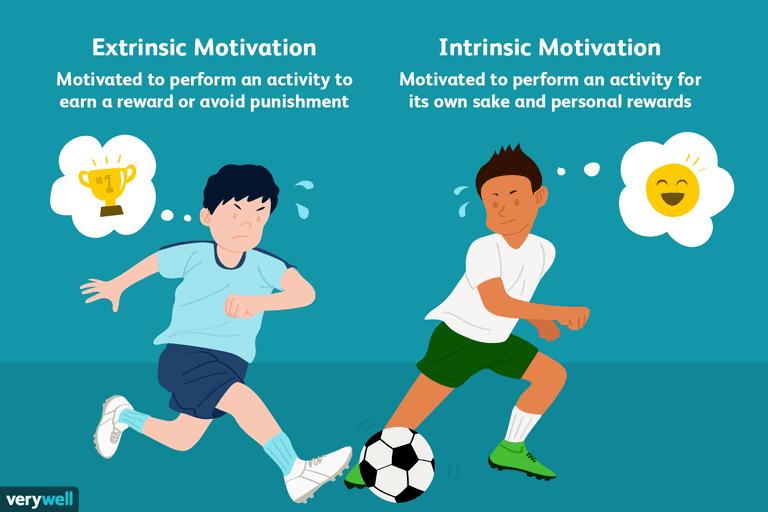More often than not, right after our alarm goes off, we are left to wonder if our job or school is really important, we weight the consequences of sleeping in or just start devising believable lies to fill the ears of our teachers or bosses. However, there are some who sprint out of their beds and race to their institutes or organisation, solely because they love the experience and wish to learn. The question arises, what causes our behavior in accordance with tasks, or more specifically, what motivates us? The answer is the two type motivational processes: Intrinsic and Extrinsic Motivation.
What is Intrinsic and Extrinsic Motivation?
Behavior results when we have a need which requires satisfaction; the demand of the need to be fulfilled gives birth to a motivational force which drives the individual to perform the task.
Basically, most things in life that we do are solely performed because we have a need to perform it; you work hard in schools to get a good job; you need a job for financial stability; you keep putting in effort in the job to maintain it, etc. In short, we are all ready to give something in exchange for something that we need.
There exist two types of motivation: Intrinsic and Extrinsic Motivation. Discussed below are their differences, their benefits and exactly how to use or apply these to your own self and others for maximum results.
Type One: Intrinsic Motivation:
Intrinsic Motivation is basically the arise of the motivational force to complete a task from inside the person, i.e. the person is motivated to engage in a behavior because it is personally rewarding. Here, the person expects no external rewards for the performance of the behavior, but rather performs due to the sake of performing.
Examples of Intrinsic Behavior:
- A person studying the entire British Monarchy in detail just because she is interested in it.
- A person engaging in sports because they find it enjoyable.
- A person solving crossword puzzles because they enjoy the challenge and excitement, etc.
In intrinsic Motivation, here are no external rewards expected by the individual, but rather just internal satisfaction.
Type Two: Extrinsic Motivation:
Extrinsic Motivation is basically the arise of the motivational force to complete a task from outside, i.e. a person is motivated to engage in a behavior because it is externally rewarding. Here, the person is not interested in the performance of the task, but rather only engages in the behavior due to its external rewards. The performance is due to the sole reason of receiving something from the external environment.
Examples of Extrinsic Motivation:
- A person working overtime in an organisation to impress the boss and receive a promotion.
- A maid working 10 hours a day, six days a week to be able to afford basic human necessities.
- A person volunteering as an unpaid intern to gather enough experience to be able to be considered for a paid job.
- A student learning the entire syllabus to achieve good grades, etc.
In Extrinsic Motivation, there are no internal rewards or interest, but rather just external rewards motivating the individual to perform.
*Intrinsic and Extrinsic Motivation and It’s Relation To Maslow’s Pyramid.
We are all too familiar with Abraham Maslow’s Hierarchy of Needs Theory; the five-story pyramid consisting of human needs, in order. As it turns out, Intrinsic and Extrinsic Motivation can also be explained through the theory.
As previously discussed, Intrinsic Motivation is the arise of a motivational force from inside the person, where they do not expect any external rewards but rather just complete a task because they find it interesting or enjoyable. This type of motivation can be connected to the last stage of Maslow’s Need Theory: Self-Actualization Needs. Self-Actualization Needs are basically Growth Needs, where the individual is focused on developing his capabilities and achieving his full potential, i.e, developing internally.
On the other hand, as previously discussed, Extrinsic Motivation is the arise of a motivational force from the external environment, where the person is driven to perform only to receive the external rewards while not being interested in the activity themselves. This type of motivation can be connected to the the first four needs listed in Maslow’s Pyramid, i.e. Physiological Needs, Security Needs, Social Needs and Esteem Needs. Here the individual is engaging in a behavior as it would grant them a reward which would satisfy any of the above mentioned needs. For example: Working to receive money which is required to buy food and survive, performing a task which would grant security, a socially anxious person going out of their way to initiate conversation in order to make friends, etc.
Intrinsic Vs. Extrinsic
Reflecting on the text above, it can be understood that the main difference between the two types of motivation lies in the fact that Intrinsic is a result from within, while Extrinsic is a result from the outside. However, researchers have found that despite there being only one main difference, both the types of motivation can have a very different effect on one’s behavior and its efficiency.
If much extrinsic motivation is presented to a person already instinctively motivated, then it will diminish any intrinsic motivation that they initially had. This is known as the overjustification effect.
However, this not does mean that Extrinsic Motivation is bad, but rather is the most effective thing when the person has no internal interest in the task. Here are some benefits:
- Extrinsic rewards can induce interest.
- External rewards can polish one’s skills, and once the individual is good at them, it can create an internal interest to perform.
There are two situations where extrinsic rewards must be avoided:
- When the individual already has internal initial interest.
- When too much external rewards can make the internally pleasing activity more as a “job” rather than “hobby”.
Usage of Extrinsic Motivation:
- Unanticipated external rewards will not decease the Intrinsic Motivation of a person.
- Praise as external reward can increase Intrinsic Motivation.
- Intrinsic Motivation will decrease if external rewards are presented even at minimal amount of work.








